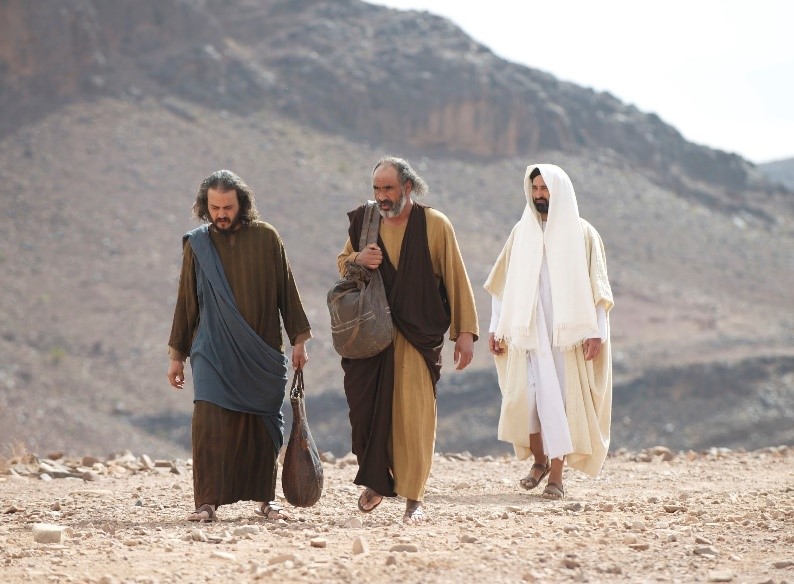 Throughout his pontificate, Pope Francis has identified a need for the Church to remain centred on the simple and beautiful act of accompaniment - a journey of presence and attentiveness with another on their pathway to discovering God. Pope Francis asks that we approach each person as ‘sacred ground’, listening and asking questions about their situation, assisting them to identify connections with the Holy Spirit already at work in their life, nurturing them toward an encounter with Jesus Christ.
Throughout his pontificate, Pope Francis has identified a need for the Church to remain centred on the simple and beautiful act of accompaniment - a journey of presence and attentiveness with another on their pathway to discovering God. Pope Francis asks that we approach each person as ‘sacred ground’, listening and asking questions about their situation, assisting them to identify connections with the Holy Spirit already at work in their life, nurturing them toward an encounter with Jesus Christ.
For decades the Church has learnt to streamline its invitation, gathering, teaching, sacraments, services and ongoing participation. Large congregations have demanded these efficiencies and have also provided unique opportunities for social developments in education, social services and health. However, in previous times the retention of believers and those seeking to become Catholic were often enculturated. Now, by contrast, we find ourselves in more secular times and smaller faith communities which require us to discover new ways to live out the Gospels.
As many communities seek out the latest program, course or online series to facilitate, the necessity of accompaniment remains the centrepiece of them all.
Accompaniment Acknowledges the Sacred
The Church will have to initiate everyone into this “art of accompaniment” which teaches us to remove our sandals before the sacred ground of the other. (EG169)
First and foremost, Pope Francis speaks of the need to recognise each person as “holy ground”, where the Spirit is already at work, where there is mystery and potential fruits. We must “take off our shoes” and draw near in reverence (CV67). This openness of heart makes possible the recognition of the Spirit (EG171) and encourages us to leave behind our assumptions and desires. It also allows us to reveal ourselves to the other.
Without this acknowledgement we often fall into the habit of processing or over-programming those who are seeking Christ. “Providing pre-packaged answers and ready-made solutions, without allowing a person’s real questions and challenges to emerge” (CV65) can result in working against the Spirit or leaving a person unfulfilled at the conclusion of a program.
Accompaniment is about acknowledging the sacred in a person and helping them to recognise the sacred in themselves.
Accompaniment Values Presence and Listening
The pace of this accompaniment must be steady and reassuring, reflecting our closeness and our compassionate gaze which also heals, liberates and encourages growth in the Christian life. (EG169)
 Jesus provides our best example of presence and listening as “he walks alongside the disciples on the way to Emmaus, even though they are going in the wrong direction” (CV292). Christ models the importance of being where seekers are. He shows that his time is their time as he listens unconditionally (CV292). Christ helps them make connections between their lived experience and the sacred Scripture. He draws upon his formation and explores it in light of their personal encounter.
Jesus provides our best example of presence and listening as “he walks alongside the disciples on the way to Emmaus, even though they are going in the wrong direction” (CV292). Christ models the importance of being where seekers are. He shows that his time is their time as he listens unconditionally (CV292). Christ helps them make connections between their lived experience and the sacred Scripture. He draws upon his formation and explores it in light of their personal encounter.
Prioritising time and attention for the other requires us to ask questions and become appreciative of their thinking and emotions. What is it they are trying to tell me? What do they want me to realise? (CV293) In responding, you may well discover that a resource or program may assist their situation, but the relationship and journey together give value and purpose to the response, while enabling growth in Christian life (EG169).
In such a busy world, whether an initial seeker or a committed Christian, taking the time to be present and listen to another, making “an investment” in accompaniment, is of the greatest value.
Accompaniment Equips for Discernment
We need to encourage and accompany processes, without imposing our own roadmaps. (CV297)
Accompaniment invites the other to explore and discover feelings, truths and the prompting of the Spirit. Holding these, we support them to reach a place of maturity where they can make free and responsible decisions (EG 171). In these moments we vanish as Jesus did, from the sight of the disciples in Emmaus, leaving them with burning hearts and a desire to set out on their own path (CV296).
In realising that each person’s situation before God is unique and known only to them (EG172), accompaniment toward discernment provides the other with patience and time to recognise the sacred deep within and already at work. It is a pathway to freedom and fruition of each person; it is something so personal that only God can know (CV295).
Discernment is the transition between discovery and direction, in which we all need accompaniment.
Accompaniment Flourishes in a Missionary Community
Genuine spiritual accompaniment always begins and flourishes in the context of service to the mission of evangelisation. (EG 173)
Accompaniment requires a community which accepts, nurtures and motivates the journey. It acts with understanding and affection and without judgement or expectation of perfection (CV 243) from the local and universal community. Communities and mentors must act not to create followers but active participants, believing wholeheartedly in a person’s ability to discern and contribute in their own way (CV 246).
 Where communities may have a shortage of those who understand or value accompaniment, they can begin to equip all members - clergy and lay, male and female, young and old - for personal accompaniment and to accompany others (CV 244). Grounded in their own humanity, those accompanying should seek holiness, be self-aware, respond in love and be on their own spiritual journey, experiencing its joys and sorrows (CV246).
Where communities may have a shortage of those who understand or value accompaniment, they can begin to equip all members - clergy and lay, male and female, young and old - for personal accompaniment and to accompany others (CV 244). Grounded in their own humanity, those accompanying should seek holiness, be self-aware, respond in love and be on their own spiritual journey, experiencing its joys and sorrows (CV246).
Missionary disciples accompany missionary disciples (EG 173).
Pope Francis’ repeated focus on accompaniment reminds us to consider more deeply the person, rather than the program or process - drawing our attention to assist those around us, seeking or committed, into an initial or ongoing encounter of the kerygma. All the faithful have a responsibility to be purposeful in acknowledging the sacred work of the Spirit already in action in those around them, taking time to listen while walking with them so as to support their spiritual journey and personal discernment.
 Pope Francis highlights accompaniment in:
Pope Francis highlights accompaniment in:
(EG) Evangelii Gaudium: The Joy of the Gospel - Apostolic Exhortation on the Promulgation of the Gospel in Today’s World.
(CV) Christus Vivit: Christ Lives – Post Apostolic Exhortation to Young People and to the People of God.
Words:
Malcolm Hart is the Director of the National Centre for Evangelisation and the Catholic Enquiry Centre. He can be contacted via director@nce.catholic.org.au
Images:
Bewakoof, Unsplash
Sheri Hooley, Unsplash
Emmaus, Lightstock
Malcolm Hart



